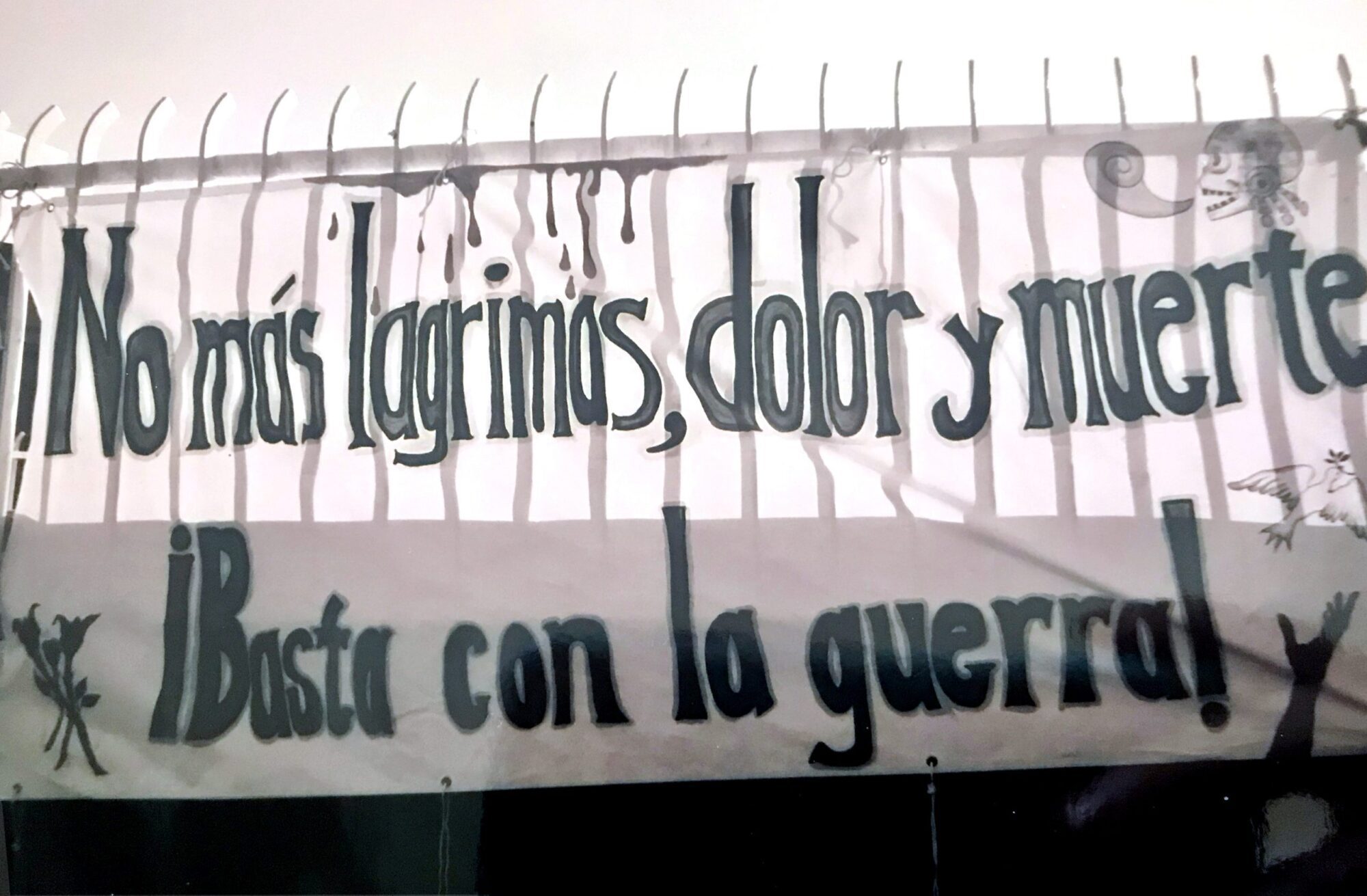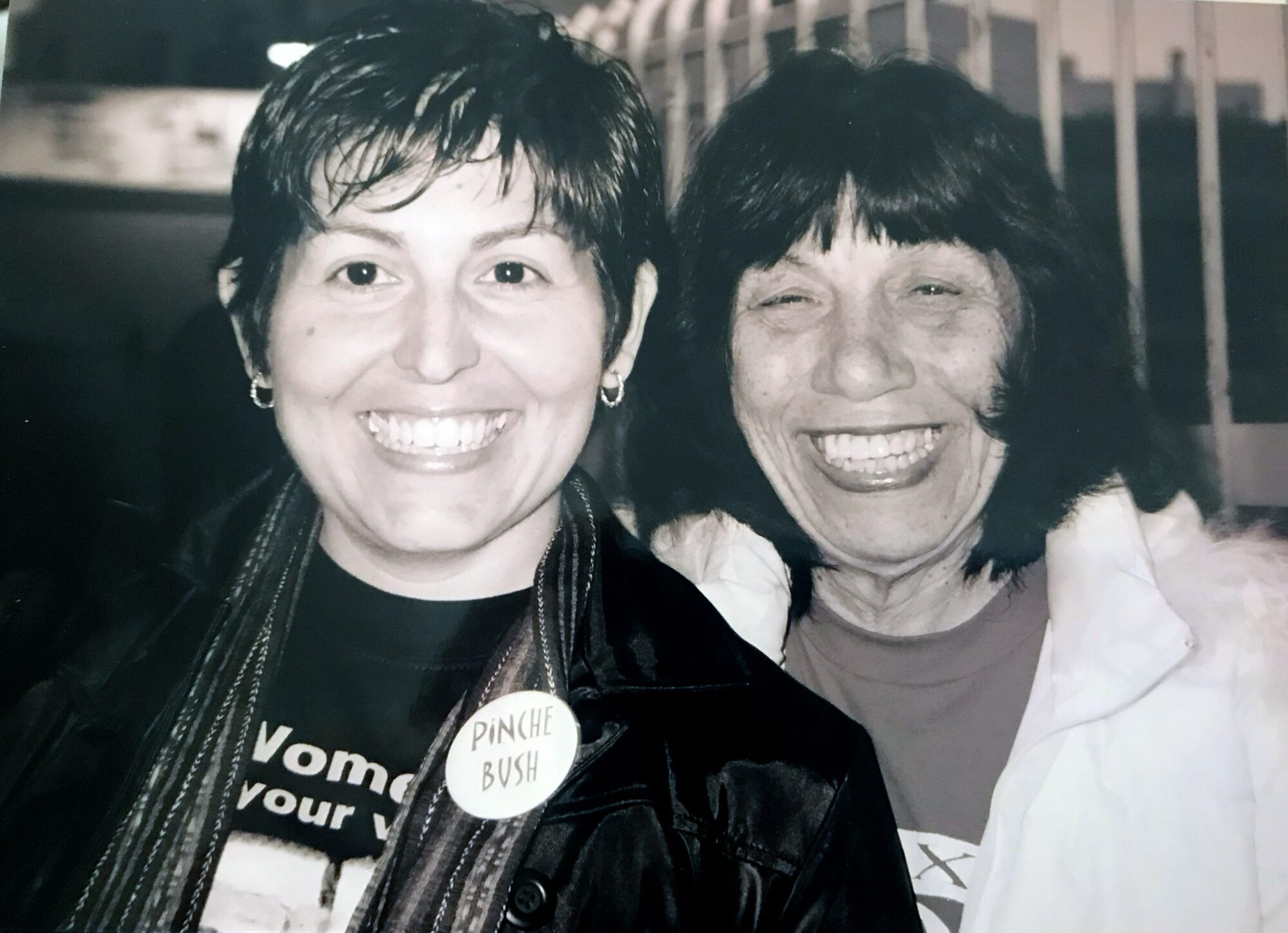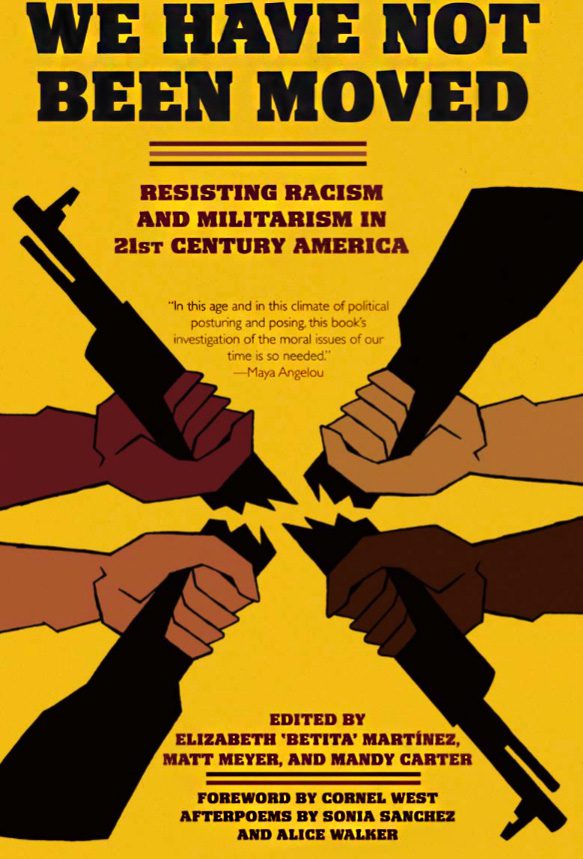Contra la Guerra

“No más lágrimas, dolor y muerte! Basta con la guerra!”
“No more tears, pain and death! Enough with war!”

This banner hung at the BART station on the corner of 24th and Mission St. where we held weekly and at times daily vigils after the March, 2003 invasion of Iraq. The vigils were organized by Latinos Contra la Guerra, an antiwar coalition Betita helped create, and other Latinx organizations including Mujeres Unidas y Activas (MUA) and Poder.
Betita co-edited an important Bay Area Newspaper, The War Times/Tiempos de Guerra, created in 2001. She wrote many articles lambasting the war including “Who Will Pay the Bill?”, a vital analysis of the war’s fiscal impact on the lives of working people in the U.S. Betita critiques the sudden windfall to the tune of hundreds of billions of dollars to massively reconstruct the post 9-11 national security government at the expense of de-funding vital services including public education and housing, maternal and children’s services and work training programs. “Think of other needs that money could fill!”
Betita’s incisive analysis was partially informed by her critique of the economic turn toward neoliberalism. Here is “A Brief Definition” she wrote with Arnoldo García in 1997: What is Neoliberalism?
The main points of neo-liberalism include:
- THE RULE OF THE MARKET. Liberating “free” enterprise or private enterprise from any bonds imposed by the government (the state) no matter how much social damage this causes. Greater openness to international trade and investment, as in NAFTA. Reduce wages by de-unionizing workers and eliminating workers’ rights that had been won over many years of struggle. No more price controls. All in all, total freedom of movement for capital, goods and services. To convince us this is good for us, they say “an unregulated market is the best way to increase economic growth, which will ultimately benefit everyone.” It’s like Reagan’s “supply-side” and “trickle-down” economics — but somehow the wealth didn’t trickle down very much.
- CUTTING PUBLIC EXPENDITURE FOR SOCIAL SERVICES like education and health care. REDUCING THE SAFETY-NET FOR THE POOR, and even maintenance of roads, bridges, water supply — again in the name of reducing government’s role. Of course, they don’t oppose government subsidies and tax benefits for business.
- Reduce government regulation of everything that could diminish profits, including protecting the environment and safety on the job.
- Sell state-owned enterprises, goods and services to private investors. This includes banks, key industries, railroads, toll highways, electricity, schools, hospitals and even fresh water. Although usually done in the name of greater efficiency, which is often needed, privatization has mainly had the effect of concentrating wealth even more in a few hands and making the public pay even more for its needs.
- ELIMINATING THE CONCEPT OF “THE PUBLIC GOOD” or “COMMUNITY” and replacing it with “individual responsibility.” Pressuring the poorest people in a society to find solutions to their lack of health care, education and social security all by themselves — then blaming them, if they fail, as “lazy.”

Clarissa Rojas recalls:
That night of the vigil we met at her home just a couple of blocks up from Mission on 24th St. We shared a burrito and talked about what we were up to. She wanted to know all about the “camino de las muertas” we had organized earlier that day at San Francisco State where students staged a “die-in” laying their bodies on the ground across the campus to call attention to the missing women in Juarez and Baghdad.
After eating we put on our jackets and headed out to the vigil. We stopped by to pick up pan dulce at the panadería. At the vigil we heard moving testimony from Central American activists who shared their experiences surviving U.S. military intervention. As survivors and refugees of war, they listed the many reasons why they stood in solidarity with the people of Iraq and called for an end to the war.
Francisco Herrera sang his movement songs and we smiled like this because that is what Betita taught us: the art of making protests joyful, the joy of building the world we want to live in.

“The bloodshed of war is not the way…”
—Betita Martinez
“Reflections after the June 12th March for Disarmament”
Excerpt from a poem by Sonia Sanchez in “We Have Not Been Moved: Resisting Racism and Militarism in 21st Century America”, co-edited by Betita Martinez, Mandy Carter and Matt Meyer. London: PM Press, 2012.
I come to you because we need to turn our eyes to the beauty of this planet, to the bright green laughter of trees, to the beautiful human animals waiting to smile their unprostituted smiles;
I have come to you to talk about our inexperience at living as human beings, thru death marches and camps, thru middle passages and slavery and thundering countries raining hungry faces…
I am here between the voices of our ancestors and the noise of the planet, between the surprise of death and life;
I am here because I shall not give the earth up to non-dreamers and earth molesters;
I am here to say to you: my body is full of veins like the bombs waiting to burst with blood. we must learn to suckle life not bombs and rhetoric rising up in redwhiteandblue patriotism;
I am here. and my breath/our breaths must thunder across this land arousing new breaths, new life. new people, who will live in peace and honor one day.